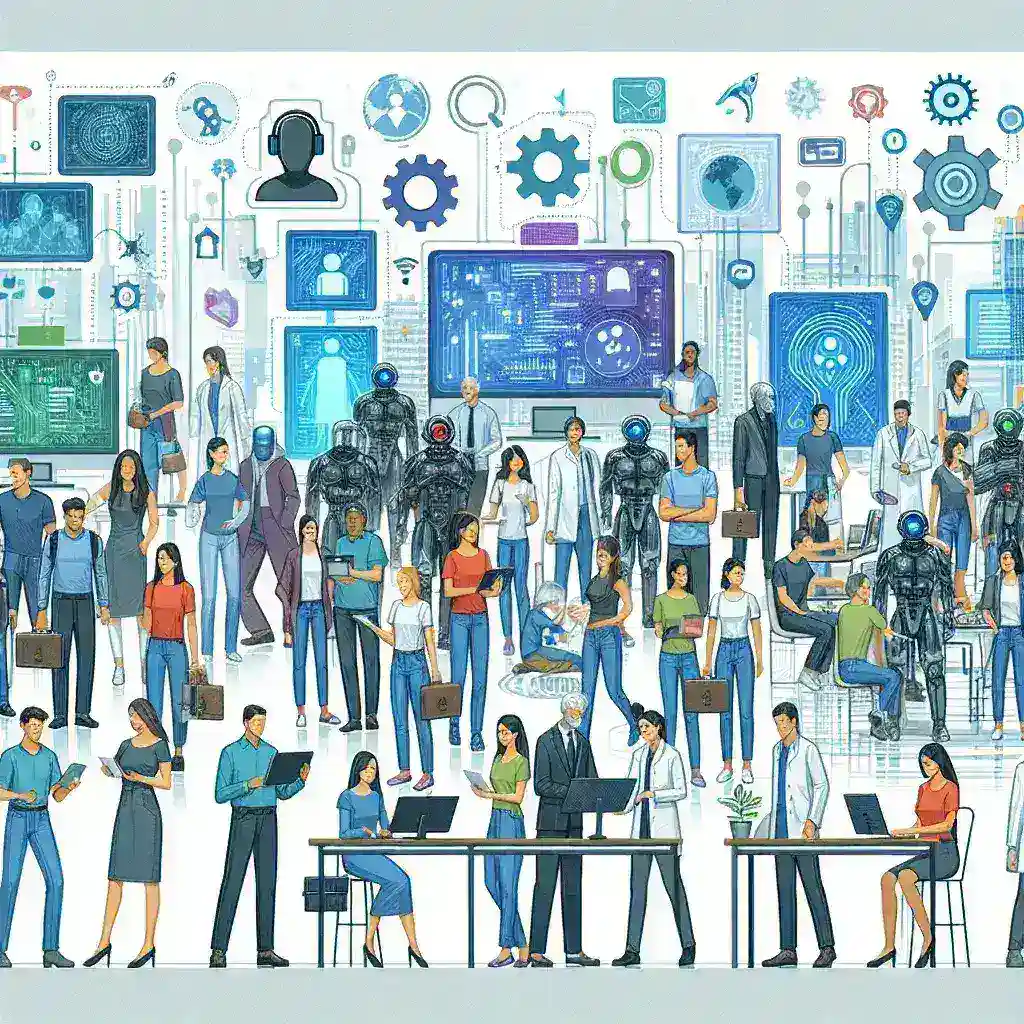The tech industry is constantly evolving, and by 2030, we can expect significant changes in the types of jobs that will be in high demand. As technology continues to permeate every aspect of our lives, the need for specialized skills will only grow. In this article, we will delve into the top tech jobs that are likely to dominate the job market in the coming decade, providing insights into the skills required, the industries they will impact, and the potential for career growth.
1. Artificial Intelligence (AI) and Machine Learning (ML) Specialists
Artificial Intelligence and Machine Learning are at the forefront of technological innovation. By 2030, AI and ML specialists will be in high demand across various sectors, including healthcare, finance, and manufacturing. These professionals will be responsible for developing and implementing AI algorithms, creating intelligent systems, and ensuring ethical and responsible AI practices.
Skills Required: Strong background in computer science, mathematics, and data analysis. Familiarity with programming languages like Python, R, and Java. Knowledge of machine learning frameworks such as TensorFlow and PyTorch. Understanding of data structures, algorithms, and statistical models.
Industries Impacted: Healthcare, finance, automotive, retail, and more.
Career Growth: AI and ML specialists can advance to roles such as AI research scientist, data scientist, and machine learning engineer, with opportunities to work on cutting-edge projects and contribute to significant advancements in technology.
2. Cybersecurity Experts
Cybersecurity is a critical concern in the digital age, and the demand for cybersecurity experts is expected to skyrocket by 2030. These professionals will play a crucial role in protecting organizations from cyber threats, ensuring data privacy, and maintaining the integrity of IT systems.
Skills Required: Comprehensive knowledge of security protocols, threat detection, and response. Proficiency in programming languages like Python, C++, and JavaScript. Understanding of network architecture and security. Familiarity with cybersecurity tools and platforms.
Industries Impacted: Finance, healthcare, government, technology, and e-commerce.
Career Growth: Cybersecurity experts can move up to roles such as chief information security officer (CISO), security architect, and cybersecurity consultant. They can also specialize in areas like ethical hacking, digital forensics, and incident response.
3. Data Scientists and Analysts
Data is the new oil, and the ability to extract meaningful insights from vast amounts of data will be highly valued by 2030. Data scientists and analysts will be crucial in helping businesses make data-driven decisions, optimize operations, and improve customer experiences.
Skills Required: Expertise in data analysis, statistics, and machine learning. Proficiency in programming languages like Python, R, and SQL. Knowledge of data visualization tools such as Tableau and Power BI. Understanding of big data technologies like Hadoop and Spark.
Industries Impacted: Marketing, finance, healthcare, manufacturing, and technology.
Career Growth: Data scientists and analysts can advance to roles such as data engineer, data architect, and chief data officer (CDO). They can also specialize in areas like predictive analytics, data mining, and business intelligence.
4. Cloud Computing Professionals
Cloud computing has revolutionized the way businesses operate, and the trend is only expected to continue. Cloud computing professionals will be in high demand to help companies migrate to the cloud, manage cloud resources, and optimize cloud-based solutions.
Skills Required: Proficiency in cloud platforms like AWS, Azure, and Google Cloud. Knowledge of cloud architecture, security, and management. Familiarity with DevOps practices and tools. Understanding of cloud-native applications and services.
Industries Impacted: Technology, finance, healthcare, and all businesses looking to leverage the cloud for scalability and efficiency.
Career Growth: Cloud computing professionals can advance to roles such as cloud architect, cloud developer, and cloud security specialist. They can also specialize in areas like cloud migration, cloud operations, and cloud DevOps.
5. Internet of Things (IoT) Developers
The Internet of Things (IoT) is transforming the way we interact with technology in our daily lives. IoT developers will be essential in creating and maintaining connected devices and systems, ensuring seamless integration and data security.
Skills Required: Proficiency in programming languages like C, C++, and Python. Understanding of embedded systems, sensor technology, and networking. Familiarity with IoT platforms and protocols. Knowledge of data analytics and machine learning.
Industries Impacted: Smart homes, industrial automation, healthcare, automotive, and consumer electronics.
Career Growth: IoT developers can advance to roles such as IoT architect, IoT project manager, and IoT security specialist. They can also specialize in areas like edge computing, fog computing, and IoT device management.
6. Blockchain Developers
Blockchain technology is gaining traction in various industries, from finance to supply chain management. Blockchain developers will be in high demand to build and maintain decentralized systems, ensuring transparency, security, and efficiency.
Skills Required: Proficiency in blockchain platforms like Ethereum and Hyperledger. Knowledge of cryptography, smart contracts, and consensus algorithms. Familiarity with programming languages like Solidity, Go, and JavaScript. Understanding of distributed ledger technology and its applications.
Industries Impacted: Finance, supply chain, healthcare, and government.
Career Growth: Blockchain developers can advance to roles such as blockchain architect, blockchain project manager, and blockchain consultant. They can also specialize in areas like decentralized finance (DeFi), non-fungible tokens (NFTs), and blockchain security.
7. Robotics Engineers
Robots are becoming increasingly prevalent in industries like manufacturing, healthcare, and agriculture. Robotics engineers will be in high demand to design, build, and maintain these advanced machines, ensuring they operate safely and efficiently.
Skills Required: Strong background in mechanical engineering, electrical engineering, and computer science. Proficiency in programming languages like C++, Python, and MATLAB. Understanding of robotics hardware and software. Knowledge of machine learning and artificial intelligence.
Industries Impacted: Manufacturing, healthcare, agriculture, and autonomous vehicles.
Career Growth: Robotics engineers can advance to roles such as robotics project manager, robotics systems engineer, and chief robotics officer (CRO). They can also specialize in areas like robotic process automation (RPA), humanoid robots, and industrial automation.
8. Quantum Computing Scientists
Quantum computing is a nascent but rapidly growing field with the potential to solve complex problems that are currently beyond the capabilities of classical computers. Quantum computing scientists will be in high demand to research and develop quantum algorithms, hardware, and applications.
Skills Required: Strong background in physics, mathematics, and computer science. Knowledge of quantum mechanics and quantum algorithms. Familiarity with quantum programming languages like Q# and Qiskit. Understanding of quantum hardware and systems.
Industries Impacted: Research, pharmaceuticals, cryptography, and advanced computing.
Career Growth: Quantum computing scientists can advance to roles such as quantum researcher, quantum engineer, and quantum data scientist. They can also specialize in areas like quantum cryptography, quantum simulation, and quantum machine learning.
9. User Experience (UX) and User Interface (UI) Designers
As technology becomes more integrated into everyday life, the importance of user experience (UX) and user interface (UI) design cannot be overstated. UX and UI designers will be in high demand to create intuitive and user-friendly digital products and services.
Skills Required: Strong understanding of user psychology and behavior. Proficiency in design tools like Adobe XD, Sketch, and Figma. Knowledge of user research methods and prototyping. Familiarity with accessibility standards and user testing.
Industries Impacted: Software development, e-commerce, healthcare, and consumer electronics.
Career Growth: UX and UI designers can advance to roles such as UX director, UX strategist, and product designer. They can also specialize in areas like user research, interaction design, and visual design.
10. Augmented Reality (AR) and Virtual Reality (VR) Developers
Augmented reality (AR) and virtual reality (VR) are revolutionizing the way we experience digital content. AR and VR developers will be in high demand to create immersive and interactive applications for a wide range of industries.
Skills Required: Proficiency in programming languages like C# and JavaScript. Knowledge of AR and VR platforms such as Unity and Unreal Engine. Familiarity with 3D modeling and animation. Understanding of user experience and interface design.
Industries Impacted: Gaming, education, real estate, and healthcare.
Career Growth: AR and VR developers can advance to roles such as AR/VR project manager, lead developer, and creative director. They can also specialize in areas like 3D game development, AR/VR content creation, and interactive design.
11. Sustainability and Green Tech Professionals
With increasing awareness of environmental issues, the demand for sustainability and green tech professionals will rise significantly by 2030. These professionals will focus on developing and implementing technologies that reduce carbon footprints, optimize energy usage, and promote sustainable practices.
Skills Required: Strong background in environmental science, engineering, and data analysis. Knowledge of renewable energy systems and sustainability practices. Familiarity with green tech platforms and tools. Understanding of regulatory and compliance requirements.
Industries Impacted: Energy, manufacturing, construction, and transportation.
Career Growth: Sustainability and green tech professionals can advance to roles such as sustainability manager, green tech consultant, and environmental technologist. They can also specialize in areas like renewable energy systems, green architecture, and sustainable manufacturing.
12. Cyber-Physical Systems Engineers
Cyber-physical systems (CPS) integrate computational and physical processes, making them essential in industries like automotive, aerospace, and manufacturing. CPS engineers will be in high demand to design, develop, and maintain these complex systems.
Skills Required: Strong background in computer science, electrical engineering, and mechanical engineering. Proficiency in programming languages like C, C++, and Python. Knowledge of embedded systems, control systems, and real-time processing. Familiarity with cybersecurity and data analytics.
Industries Impacted: Automotive, aerospace, manufacturing, and smart cities.
Career Growth: CPS engineers can advance to roles such as CPS architect, CPS project manager, and systems engineer. They can also specialize in areas like autonomous vehicles, industrial automation, and smart grid technology.
13. Biotechnology and Bioinformatics Professionals
The intersection of technology and biology is giving rise to new opportunities in biotechnology and bioinformatics. Professionals in these fields will be in high demand to develop and analyze biological data, contributing to advancements in healthcare, agriculture, and environmental science.
Skills Required: Strong background in biology, genetics, and data science. Proficiency in programming languages like Python and R. Knowledge of bioinformatics tools and databases. Familiarity with machine learning and data visualization.
Industries Impacted: Healthcare, pharmaceuticals, agriculture, and environmental science.
Career Growth: Biotechnology and bioinformatics professionals can advance to roles such as bioinformatics scientist, biotech project manager, and computational biologist. They can also specialize in areas like genomics, proteomics, and drug discovery.
14. Quantum Information Scientists
Quantum information science combines principles from quantum mechanics and information theory to develop new technologies and applications. By 2030, quantum information scientists will be in high demand to research and innovate in this cutting-edge field.
Skills Required: Strong background in physics, mathematics, and computer science. Knowledge of quantum mechanics and information theory. Familiarity with quantum programming languages and tools. Understanding of quantum algorithms and protocols.
Industries Impacted: Research, cryptography, and advanced computing.
Career Growth: Quantum information scientists can advance to roles such as quantum researcher, quantum systems engineer, and quantum information specialist. They can also specialize in areas like quantum cryptography, quantum communication, and quantum computing.
15. Digital Transformation Managers
As businesses continue to adopt digital technologies, the role of digital transformation managers will become increasingly important. These professionals will be in high demand to lead the transition to digital platforms, implement new technologies, and drive business growth.
Skills Required: Strong leadership and project management skills. Proficiency in digital tools and platforms. Knowledge of business strategy and operations. Familiarity with emerging technologies like AI, blockchain, and IoT.
Industries Impacted: All businesses looking to leverage digital technologies for growth and efficiency.
Career Growth: Digital transformation managers can advance to roles such as chief digital officer (CDO), digital transformation consultant, and digital strategy director. They can also specialize in areas like digital marketing, e-commerce, and process optimization.
Conclusion
The tech industry is poised for significant growth and transformation by 2030. The top tech jobs mentioned in this article represent a diverse range of skills and industries, offering exciting opportunities for those looking to build a career in technology. Whether you are an experienced professional or just starting out, now is the time to acquire the skills and knowledge needed to succeed in these high-demand roles. Embrace the future of tech and position yourself for success in the decade ahead.




